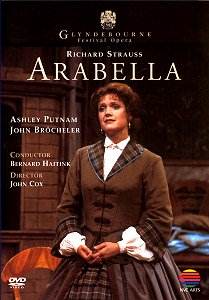This is a straightforward
conventional staging of this, the last
collaboration between Hugo von Hofmannsthal
and Richard Strauss. (Arabella
was world premiered at the Dresden Staatsoper
on July 1st 1933.) Julia Trevelyan Oman’s
delightful designs make excellent use
of all the small Glyndebourne stage
– especially for the ballroom setting
of Act II where the swirling dancers
seen through the doors at the back of
the stage give an illusion of great
depth and spaciousness. The colourful
costumes add splendour to the old world
Viennese setting.
Ashley Putnam is nicely
cast in the title role although, for
me, she cannot dispel the beauty of
voice and the charms of the gorgeous
Lisa Della Casa (and, to a slightly
lesser degree, Kiri Te Kanawa). Putnam
sings with style and grace and she is
adroit in suggesting her character’s
girlish teasing nature and swift mood
changes. She is affecting in her Act
I aria ‘Aber der Richtige’ in which
she dreams of the right man coming and
dispelling her doubts. In her final
aria when she offers the glass of water
to Mandryka signalling her forgiveness
for his unfounded accusations. She also
shines in her lovely Act I duet with
her sister Zdenka (another example of
Strauss’s magnificent writing for the
soprano voice). Gianna Rolandi is an
ideal Zdenka, dressed as a boy because
their parents cannot afford the expense
of a second daughter and the cause of
all the misunderstandings. She very
nearly steals the show in Act I.
The character of Mandryka,
granted, is boorish yet Bröcheler,
although splendidly fiery, when he thinks
he has been cheated by Arabella, is
rather too stiff and too unsympathetic.
His bass-baritone intonation is firm
and virile.
The lovesick Matteo
duped by Zdenka who is hopelessly in
love with him, is very well portrayed
by Keith Lewis. Regina Sarfaty as Adelaide
is characterful and flirty like her
eldest daughter. Arthur Korn is a first
class as the dignified father, Count
Waldner. Gwendolyn Bradley is nicely
coquettish in the cameo coloratura role
of Fiakermilli.
Bernard Haitink’s orchestral
direction provides an ideal accompaniment
to the singers yet allowing a transparency
for Strauss’s alluring but complex textures.
The dramatic and voluptuous orchestral
Prelude to Act III underscoring the
characters’ complicated comings and
goings makes a fine impact.
Again I have to protest
about the laughable lack of documentation
with these NVC Arts opera reissues.
This DVD does not have a booklet, there’s
no synopsis, no notes about composer,
opera or artist portraits; and not even
a proper cast list, only a track listing
on the inside of the box!
A most satisfying production
with Putnam well cast in the title role
supported by a fine Zdenka in Gianna
Rolandi.
Ian Lace
